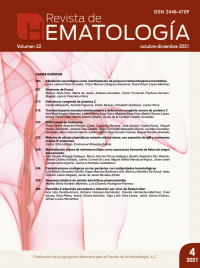Acquired hemophilia A secondary to Epstein-Barr virus infection.
Rev Hematol Mex. 2021; 22 (4): 266-270. https://doi.org/10.24245/rev_hematol.v22i4.7276
Ana Lilia Peralta-Amaro,1,3 Adriana Vázquez-Hernández,1,3 Claudia Hernández-Martínez,1,3 Eniel Alonso Oliva-Pérez,1 Arturo Olvera-Acevedo,1,3 Olga Lidia Vera-Lastra,1,3 Jaime García-Chávez,2,3 Abihai Lucas-Hernández1,3
1 Department of Internal Medicine.
2 Department of Hematology.
Hospital de Especialidades Dr. Antonio Fraga Mouret, Centro Médico Nacional La Raza, Instituto Mexicano del Seguro Social, Mexico City, Mexico.
3 Division of Post-graduate Studies, Faculty of Medicine, Universidad Nacional Autónoma de México, Mexico City, Mexico.
Abstract
BACKGROUND: Acquired hemophilia A is a bleeding disorder that is usually presented as an idiopathic entity; nevertheless, it has been attributed to other factors, such as autoimmune, malignancy, infections, among others. The diagnosis is made when autoantibodies against epitopes of factor VIII (FVIII) are evidenced, causing the neutralization of the FVIII coagulant activity.
CLINICAL CASE: A 34-year-old female patient that presented with coagulopathy after Epstein-Barr virus (EBV) infection verified by IgG against the nuclear antigen of EBV, secondary causes, like autoimmune, pregnancy, drugs, and others were ruled out. This patient improved after receiving treatment with factor VIII, and complete remission was obtained with rituximab and steroids. After a three-year follow up there has not been any new episode of coagulopathy.
CONCLUSIONS: Acquired hemophilia A is a life-threatening entity, if not diagnosed and treated promptly it can be fatal. To the best of our knowledge, this is the first case of Epstein-Barr virus-associated acquired hemophilia A.
KEYWORDS: Hemophilia A; Epstein-Barr virus; Factor VIII.
Resumen
ANTECEDENTES: La hemofilia A adquirida es un trastorno hemorrágico que suele manifestarse como una enfermedad idiopática; sin embargo, se ha atribuido a otros factores, como autoinmunitario, malignidad, infecciones, entre otros. El diagnóstico se establece cuando se evidencian autoanticuerpos contra epítopos del factor VIII (FVIII), que provocan la neutralización de la actividad coagulante del FVIII.
CASO CLÍNICO: Paciente femenina de 34 años que tuvo coagulopatía posterior a infección por virus de Epstein-Barr (EBV) comprobada por IgG contra el antígeno nuclear de EBV; se descartaron causas secundarias, como autoinmunitaria, embarazo, fármacos, entre otras. La paciente mejoró tras recibir tratamiento con factor VIII y se obtuvo remisión completa con rituximab y esteroides. Tras tres años de seguimiento no ha habido ningún nuevo episodio de coagulopatía.
CONCLUSIONES: La hemofilia A adquirida es una afección que amenaza la vida, si no se diagnostica y trata oportunamente puede ser mortal. Hasta donde sabemos, éste es el primer caso de hemofilia A adquirida asociada con el virus de Epstein-Barr.
PALABRAS CLAVE: Hemofilia A; virus de Epstein-Barr; factor VIII.
Received: January 2022
Accepted: March 2022
This article must be quoted: Peralta-Amaro AL, Vázquez-Hernández A, Hernández-Martínez C, Oliva-Pérez EA, Olvera-Acevedo A, Vera-Lastra OL, García-Chávez J, Lucas-Hernández A. Acquired hemophilia A secondary to Epstein-Barr virus infection. Hematol Méx 2021; 22 (4): 266-270.

